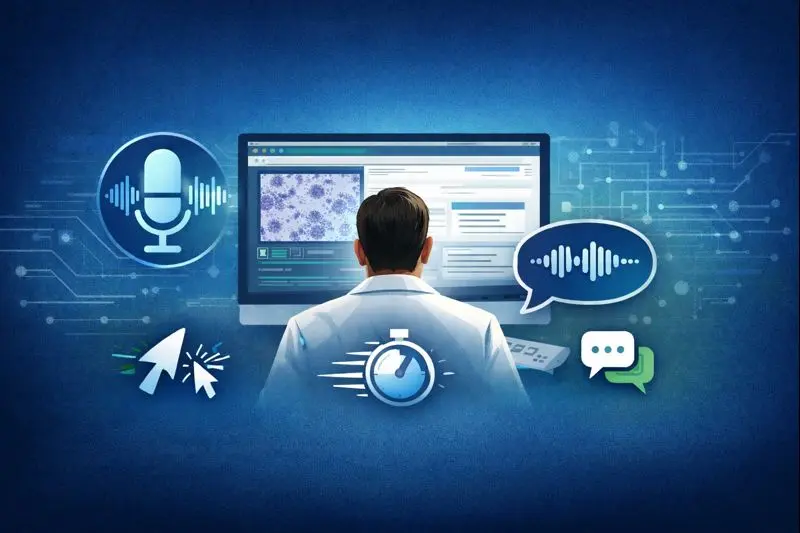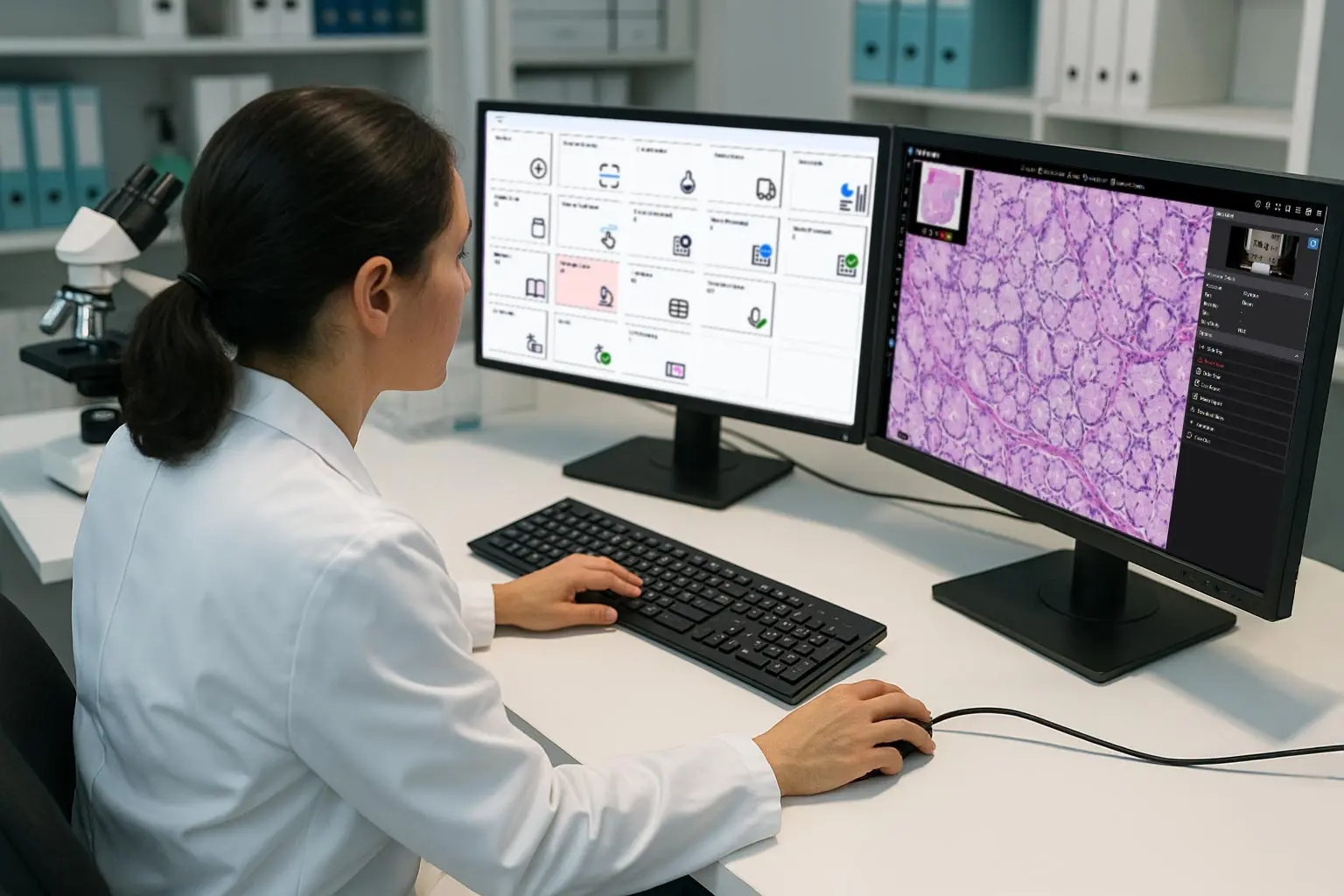Blog
Pathology Lab Software: Determining Which LIS System is the Best Fit for Your Laboratory
December 11, 2025
Clinical laboratory management and service represent big business. Currently valued at well over $200 billion annually, the global market is expected to reach a staggering $290 billion by 2028.
The secret behind this impressive growth is the growing demand for advanced pathology lab software, such as laboratory information systems and laboratory information management systems.
By using these innovative diagnostic lab software solutions, labs can enhance laboratory workflow management, boost efficiency, and streamline the (often complicated) laboratory billing process.
Discover More: The Best Laboratory Information System Companies and the Advantages They Offer to Their Laboratory Clients
Types of Pathology Lab Software
Pathology lab software can be confusing. Sometimes definitions are unclear or change over time.
For example, laboratory information systems (LIS systems) and lab information management software (Lab LIMS) previously referred to very different concepts and workflows, but today their meanings overlap.
Additionally, the term pathology software is often used interchangeably with laboratory information system (LIS) software and, more broadly, to describe any pathology lab management tools used within medical laboratory environments.
Taking it even a step further, we at LigoLab call our laboratory information system software an “all-in-one medical LIS and lab billing informatics platform” because it goes beyond the basic tenets of laboratory information system functions by including a powerful lab revenue cycle management module (lab RCM), and serves as an end-to-end enterprise-grade LIS pathology solution for all medical laboratory specialties.
The LigoLab platform features modules for anatomic pathology, clinical laboratory, molecular diagnostics, lab revenue cycle management, and direct-to-consumer lab testing (TestDirectly and TestDirectly.com), all on a silo-free and fully integrated application that supports every role, department, and case. This empowers medical laboratories to achieve an efficiency level that drives differentiation, supports rapid scaling, and, most importantly, increases profitability.
Join us as we break down commonly used pathology lab reporting software and spotlight the capabilities that set LigoLab apart from other laboratory information system companies.
Discover More: Six Factors That Should Be Considered Before Upgrading Your Lab's Pathology Reporting Software
What is a Laboratory Information System (LIS Healthcare)?
Laboratory information systems (LIS lab solutions) are the most common pathology lab software suites found in medical labs.
Traditionally, the LIS system brings an entire operation under one umbrella, establishing and maintaining a centralized database for all laboratory departments and workflow.
Key Laboratory Information System Functions
- Centralized Database: Pathology LIS systems consolidate data from all laboratory departments and processes, facilitating seamless specimen management (sample tracking) and test result reporting.
- Compliance: Medical LIS systems ensure adherence to guidelines from CAP (College of American Pathologists), CLIA (Clinical Laboratory Improvement Amendments), HIPAA (Health Insurance Portability and Accountability Act), and other regulatory agencies, mitigating compliance concerns and avoiding penalties.
- Efficient Lab Processes: LIS lab solutions manage tasks such as patient demographic data collection, specimen and test result tracking, order tracking, quality control, diagnosis and treatment recommendations, instrument interoperability, and interfacing with third parties (such as physician customers, insurance companies, and customer service).
- Data Analysis and Reporting: Healthcare LIS systems offer robust data analysis, reporting, and audit capabilities that assist with lab performance and decision-making.
- Digital Pathology Workflow: Modern laboratory information systems support advanced digital pathology solutions and enable automated LIS lab workflow, replacing paper-based records and legacy pathology software systems. This results in fewer errors, faster processing times, lower costs, and increased scalability.
- Lab Revenue Cycle Management (Lab RCM): Medical LIS systems integrated with advanced laboratory billing solutions can transform RCM cycle visibility and optimize technical and financial performance.
- Sample Tracking System: Medical laboratory information system software ensures accurate tracking of specimens and test results, enhancing overall lab efficiency.
LigoLab’s all-in-one informatics platform is a prime example of a modern, integrated LIS system, as it frees users from restrictions like paper forms and siloed laboratory software systems that cause interoperability issues. With a single pathology lab software infrastructure covering all technical and financial workflows, the platform’s end-to-end data integrity is ensured (learn more about the power of integration by clicking on the Avero Diagnostics case study).
The Power of LIS Software and Effective Outreach
LIS software has become a key aspect of pathology lab management and outreach. For example, to streamline outreach processes, labs should be able to connect with customers, payers, and other third parties through automated digital portals (such as LigoLab Connect).
Top-notch LIS pathology information system solutions can easily accommodate this digital connection and provide pre-loaded, customizable templates that make lab workflow management and reporting a breeze.
Industry Insights: The Competitive Edge in Laboratory Outreach - Enhancing Value Beyond Price
Why LIS Software and Lab RCM Interoperability Matter
Accurate and timely reporting is essential for efficient lab workflow and revenue cycle management.
While the laboratory information system manages patient and specimen data within the technical workflow, the RCM cycle involves laboratory billing operations and communication with external lab billing services, forming the financial backbone of the lab.
Top-tier pathology lab software providers like LigoLab offer integrated solutions that fully support medical LIS functionality and the entire laboratory billing process, ensuring seamless operations from order to payment.
White Paper: The Connected Laboratory - Leveraging Medical LIS & Lab RCM Integration to Grow Your Business

Powerful and Flexible Pathology Lab Reporting Software
LigoLab’s platform features advanced reporting engines that give users agency to control and customize reports across the lab information system and RCM cycle workflows.
Editor’s Note: If interested, you can experience the value of LigoLab’s integrated medical laboratory information system with advanced lab billing capabilities firsthand by downloading free report template samples designed to enhance clarity, efficiency, and client satisfaction. Or click the URL below to learn about the reporting capabilities housed within this modern medical LIS platform.
Discover More: How LigoLab's Pathology Lab Software Supports Lab Report Customization and Client Preferences
Laboratory Information System Companies: Meeting the Growing Demands of the LIS Healthcare Industry
The market for LIS healthcare systems in the U.S. is estimated at roughly $650 million, and all signs point to consistent growth throughout this decade.
Most laboratory information system companies realize this and respond to customer demands for enhanced information technology to support higher productivity, reduced costs, fewer errors, and better data management and analysis.
These needs are compounded by external pressure on laboratories to provide seamless integration with third parties such as public health agencies, payers, physicians, and lab billing services.
Discover More: Laboratory Information System Software and Its Role in Overcoming Laboratory Staffing Challenges
Legacy LIS Systems vs. Future-Ready & Scalable Laboratory Information System Solutions
Medical laboratories relying on outdated LIS pathology systems without essential modules or modern features are at a clear disadvantage. These legacy LIS system platforms limit scalability and impede a lab’s ability to keep pace with an evolving market.
By contrast, labs that implement future-ready, scalable LIS software solutions can adapt quickly and confidently to new demands. When evaluating LIS vendors, laboratories should look beyond basic functionality and consider which platforms truly support long-term growth, seamless integration, and operational agility.
For example, LigoLab delivers a comprehensive, forward-thinking laboratory information system that’s designed to help labs stay competitive, efficient, and well-positioned for the future of healthcare.
Discover More: What You Need to Know Before Contracting with a Laboratory Information System (LIS) Company

What is a Laboratory Information Management System (Lab LIMS)?
The difference between a laboratory information system and a laboratory information management system (LIMS) is often unclear among lab personnel.
Although these laboratory software systems share core capabilities, such as centralized workflows, sample tracking, diagnostic tools, and real-time data access, they also differ in several important ways.
LIS vs. LIMS: What is the Difference?
Medical laboratory information system software and laboratory information management system software play essential roles in the vast laboratory landscape. However, they differ in their primary focus, end-users, and complexity.
Core Focus
- Laboratory Information System: The LIS system prioritizes individual patient records and data storage and management, including lab test results. The medical LIS software caters primarily to individual needs.
- Laboratory Information Management System: The lab LIMS emphasizes sample-oriented data and laboratory operational workflows in a commercial rather than medical setting. LIMS vendors build systems capable of processing and analyzing large data batches, such as complex sample data from drug trials or biological testing.
End-Users
- Laboratory Information System: The LIS system is designed for pathology and clinical laboratories, veterinary clinics, and hospitals.
- Laboratory Information Management System: The lab LIMS is used in commercial settings, such as pharmaceutical labs, manufacturing plants, and water treatment or food and beverage testing facilities.
It's important to note that the distinctions between a laboratory information system and a LIMS lab management software are becoming less clear over time. However, understanding their key differences (LIS vs LIMS) can help clinical laboratories and pathology groups choose the most suitable lab software for their needs.
Discover More: Differences Between Laboratory Information Management Systems (LIMS) and Laboratory Information Systems (LIS)
Lab LIMS: Key Features & Compliance Standards
A laboratory information management system provides critical data insights to key stakeholders, enabling more informed decisions across operations, maintenance, and product development.
Modern LIMS lab management software platforms also come equipped with built-in compliance tools and industry standards, with LIMS vendors helping sample-centric labs maintain performance while meeting regulatory requirements.
Key Compliance Standards in Modern Lab LIMS Solutions
Today's lab LIMS solutions frequently adhere to the following compliance standards:
- ISO 17025: This international standard specifies the general requirements for the competence of testing and calibration laboratories.
- Good Laboratory Practice (GLP): A set of principles that provides a framework for the organization and management of test facilities while ensuring the quality and integrity of test data.
- 21 CFR Part 11: A set of FDA regulations that define the criteria for electronic records and signatures to be considered trustworthy, reliable, and equivalent to paper records in a compliant laboratory environment.
More Laboratory Workflow Management Tools
Laboratory Revenue Cycle Management (Laboratory Billing)
Lab revenue cycle management software, in-house billing software for labs, facilitates revenue collection from patients, providers, and insurance companies while managing the laboratory billing process.
The rapid growth of the RCM cycle software market accurately reflects the growing importance of having an effective laboratory billing strategy to combat market challenges and remain efficient and productive as a lab business.
Key Benefits of Modern Laboratory Billing Solutions
Modern laboratory billing solutions offer numerous advantages by digitizing and automating the laboratory billing process, including:
- Collecting patient insurance and demographic information
- Charge capture
- Coding
- Claim submission
- Payment collections
These features significantly improve the RCM cycle and revenue collection, helping laboratories navigate the increasingly complex claims reimbursement process, rising demands from third-party payers for digitalization and improved efficiency, and the shift toward value-based reimbursements.

LigoLab Informatics Platform: A Comprehensive LIS System and Lab Billing Solution
A deeply integrated laboratory information system, such as the LigoLab Informatics Platform, provides users with multiple lab billing benefits, such as:
- Real-time verification, eligibility, and scrubbing components
- Automated ICD and CPT coding
- Automated client billing
- Much more
These capabilities result in fewer denials, reduced audit risk, increased collected revenue, improved cash flow, and enhanced profitability.
Discover More: The Power of Integration - Unleashing the Potential of LigoLab's LIS System & Lab RCM Platform
Scientific Data Management Systems (SDMS)
Scientific data management systems (SDMS) can be categorized as laboratory data management system software or laboratory data analysis software. They are designed to capture, catalog, and archive data generated by laboratory instruments and applications, providing an efficient solution for handling diverse data types.
Key Features of SDMS
SDMS solutions offer several essential features that set them apart from typical LIS systems and lab information management system software, which primarily deal with homogeneous data:
- Ability to handle unstructured, structured, and semi-structured data, including PDF files, images, instrument data, and spreadsheets.
- Integration of lab-generated data with administrative information, such as standard operating procedures and safety documents.
- Centralized database with easily searchable indices.
These features support efficient handling of diverse data types, helping to streamline laboratory workflows and data management processes.
Enhancing Research Productivity with SDMS
SDMS can improve research productivity through collaborative efforts between various departments or organizations. By providing a centralized data storage and management platform, SDMS promotes effective communication and collaboration, ultimately driving innovation and progress in the laboratory environment.
Computerized Maintenance Management System (CMMS)
A computerized maintenance management system (CMMS), sometimes called a CMMIS (computerized maintenance management information system), helps laboratories optimize performance against the key metric of reliable uptime.
CMMS achieves this by scheduling, managing, and reporting on maintenance operations, with its database serving as a central repository for information about an organization's assets, equipment, materials, and other resources.
CMMS Features Within the LigoLab Platform
Some laboratory information systems, including the LigoLab platform, incorporate CMMS-like functionality, offering a comprehensive audit trail and robust sample tracking and management tools. These capabilities allow users to monitor every action and entity with controlled permissions and visibility, while tracking each specimen with a unique identifier that maintains the chain of custody and ensures security.
As a result, modern pathology LIS software platforms like LigoLab greatly reduce the risk of lost or misplaced orders, improving both operational efficiency and overall laboratory security.
Discover More: How Specimen Tracking Software Improves Efficiency and Reduces the Chance for Diagnostic Errors

The Evolution & Future of Laboratory Software Systems
The future of laboratory software systems can be analyzed from two perspectives:
- The growth of the laboratory service market
- Laboratory software systems development
A few significant factors are driving the laboratory service market growth:
- An aging population
- A growing awareness of preventative health measures
- The increasing importance of disease surveillance and screening
- Patients taking a more active role in their healthcare
To make the most of this growth, labs should embrace innovative technology.
TestDirectly is a great example of this: it's a web-based direct-to-consumer lab testing portal that enables easy and accurate lab testing by connecting patients directly with labs.
Discover More: Highlighting the Versatility of the TestDirectly Direct-to-Consumer Lab Testing Portal
Interestingly, the laboratory software systems market is expanding more rapidly than the laboratory services market. Clinical labs and pathology groups are in the midst of an IT revolution, as their data-intensive work requires effective data use and reporting, thanks to insurance companies and other third-party payers increasingly demanding automated and digital reporting.
Another factor propelling the growth of laboratory software systems is the number of labs still relying on paper-based or outdated laboratory workflow management systems.
Modern IT solutions that deliver digitization and automation are now essential for supporting the complex daily operations of today’s laboratories and enabling future growth. Implementing advanced diagnostic lab software directly boosts efficiency, productivity, and overall performance.






